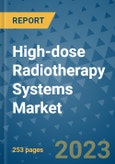Elevating Cancer Treatment Through Technological Advancements
Technological innovation stands at the forefront of the increasing demand for high-dose radiotherapy systems, enhancing the precision and applicability of radiation therapy. The utilization of radiation therapy for a broader spectrum of cancer cases is on the rise.Radiation therapy (RT) serves as a fundamental non-surgical treatment option for lung cancer and plays a pivotal role in the multidisciplinary management of thoracic cancers. Recent technological advancements in radiotherapy procedures and novel fractionation models have improved long-term disease control while reducing radiation-related adverse effects.
Pioneering Technologies Transforming Radiation Therapy
Advancements such as Intensity-Modulated Radiotherapy (IMRT), Stereotactic Radiotherapy, Image-Guided Radiotherapy (IGT), and Particle Therapy have streamlined treatment planning, precise tumor delineation, and dose estimation. These developments are poised to drive the utilization of high-dose radiation systems for cancer treatment in the near future.Innovative Launches Propel Market Growth
The launch of new and innovative radiotherapy systems bolsters market growth, offering more cost-effective and compact alternatives to existing equipment. Advanced hardware and software systems usher in new standards of care.Elekta's MR-Linac: Elekta's MR-Linac, the Elekta Unity system, secured CE marking in October 2022, facilitating its use in radiation therapy for cancer treatment.
Zeiss' Intrabeam System: In March 2022, Zeiss introduced the Intrabeam system in India, providing intraoperative radiation therapy (IORT) for early-stage breast cancer patients.
Enhanced software versions aim to optimize workflow in radiation therapy, promoting seamless integration and improved treatment system optimization. These software systems enable comprehensive data collection, storage, and analysis, further advancing the field.
Lucrative Opportunities for Manufacturers
'Technological Advancements and Growing Demand for Effective Radiotherapy Solutions'Collaborative mergers and partnerships between market players create lucrative opportunities for manufacturers of radiotherapy systems and software products. These endeavors, focusing on improving technologies, reducing costs, and expanding commercial reach, encompass both hardware and software companies.
Recent technological advancements have made radiotherapy more effective, resulting in better quality of life and improved cancer patient management. Notable advancements, including the multileaf collimator, integration of imaging technologies (such as CT and PET), advanced dose calculation algorithms, and novel delivery techniques, have significantly enhanced tumor dose distribution while minimizing toxicity in healthy tissues.
The integration of artificial intelligence (AI) with radiotherapy systems and software opens profitable avenues for high-dose radiotherapy system manufacturers. AI technologies optimize treatment planning systems and accelerate the analysis of patient data, classifying cancer types and streamlining treatment processes.
Expanding radiation therapy capacity is driven by the increasing cancer incidence. The demand for cost-effective equipment presents an opportunity for companies to launch reasonably priced alternatives, thereby expanding their market share.
Challenges in Market Expansion
'High Equipment Cost and Availability of Alternative Therapies'The substantial cost of radiotherapy systems poses a significant challenge to market growth. External beam radiation therapy (EBRT) machines and proton therapy systems come with substantial price tags, alongside expenses for establishing treatment rooms.
These expenses elevate the overall cost of services, making them inaccessible to a significant portion of patients, particularly in low- and middle-income countries. The presence of alternative cancer treatment methods, such as chemotherapy and surgery, and advancements in these approaches, can limit the adoption of high-dose radiotherapy systems.
Country-wise Insights
United States Dominance: The U.S. market's dominance is attributed to the increasing use of radiotherapy in cancer treatment and management. It is expected to maintain its leading position due to rising cancer incidence, growing healthcare expenditure, research initiatives, key player presence, and supportive government initiatives.Germany's Emerging Market: Germany is emerging as a prominent market for high-dose radiotherapy systems, driven by the increasing cancer prevalence and technological advancements in radiotherapy. Advanced imaging techniques and precise delivery systems are creating opportunities for more effective treatments.
Opportunities in China: China's substantial population and the highest cancer incidence globally generate significant demand for high-dose radiotherapy systems. The unique cancer profile in China, with prevalent cancer types, necessitates specialized radiotherapy solutions.
Competition Landscape
The high-dose radiotherapy systems market is intensely competitive, with key players pursuing partnerships, product launches, and market expansion strategies.Key Companies Covered:
- Varian Medical Systems
- Elekta AB
- Accuray Incorporated
- Mevion Medical Systems
- ViewRay, Inc
- Isoray, Inc
- Hitachi Ltd
- C.R. Bard
- Panacea Medical Technologies
- Johari Digital Healthcare Ltd
- Diapulse Corporation of America
- Neutron Products, Inc
- Agile MV
- TomoTherapy Incorporated
- P-Cure, Ltd
- Provison Healthcare, LLC
- Ion Beam Applications S.A.
High-dose Radiotherapy Systems Industry Research Segmentation
By Product:
- LINAC Devices
- Proton Therapy Devices
- Brachytherapy
By End User:
- Hospitals
- Cancer Treatment Centers & Clinics
- Research Centers
By Region:
- North America
- Latin America
- Europe
- South Asia
- East Asia
- Oceania
- Middle East and Africa
This product will be delivered within 1-3 business days.
Table of Contents
Companies Mentioned
- Varian Medical Systems
- Elekta AB
- Accuray Incorporated
- Mevion Medical Systems
- ViewRay, Inc.
- Isoray, Inc.
- Hitachi Ltd.
- C.R. Bard
- Panacea Medical Technologies
- Johari Digital Healthcare Ltd.
- Diapulse Corporation of America
- Neutron Products, Inc.
- Agile MV
- TomoTherapy Incorporated
- P-Cure, Ltd.
- Provison Healthcare, LLC
- Ion Beam Applications S.A.








